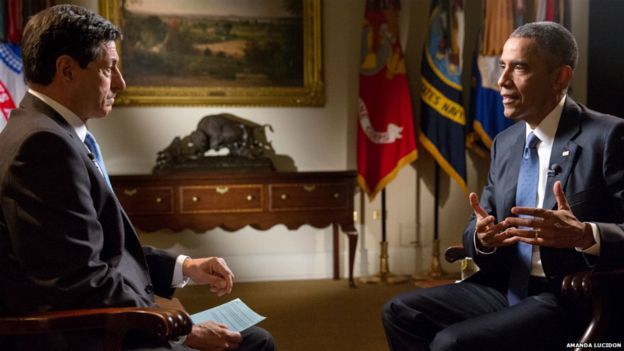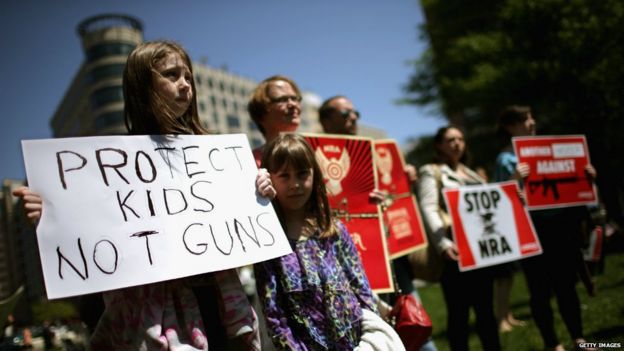
In an interview with the BBC, Mr Obama said it was "distressing" not to have made progress on the gun law issue "even in the face of repeated mass killings".
He vowed to keep trying, but the BBC's North America editor Jon Sopel said the president did not sound very confident.
However, Mr Obama said race relations had improved during his presidency.
In a wide-ranging interview, President Obama also said:
- The UK must stay in the EU to have influence on the world stage
- He is confident the Iran nuclear deal will be passed by Congress
- Syria needs a political solution in order to defeat the Islamic State group
- He would speak "bluntly" against corruption and human rights violations in Kenya
- He would defend his advocacy of gay rights following protests in Kenya
- Despite racial tensions, the US is becoming more diverse and more tolerant
"If you look at the number of Americans killed since 9/11 by terrorism, it's less than 100. If you look at the number that have been killed by gun violence, it's in the tens of thousands," Mr Obama said.

The president said he would continue fighting for greater gun control laws
"For us not to be able to resolve the issue of gun control has been something that is distressing," he added.
Mr Obama has pushed for stricter gun control throughout his presidency but has been unable to secure any significant changes to the laws.
After nine African-American churchgoers were killed in South Carolina in June, he admitted "politics in this town" meant there were few options available.
Analysis: Jon Sopel, BBC News, Washington
Nine months ago, the president seemed like a spent force, after taking a beating in the midterm elections, during which members of his own party were reluctant to campaign on his record.
But the man sat before me today was relaxed and confident, buoyed by a string of "wins" on healthcare, Cuba and Iran, after bitter and ongoing battles with his many critics.
The only body swerve the president performed was when I asked him how many minds he had changed on the Iran nuclear deal after an intense sell aimed at Gulf allies and members of US Congress who remain implacably opposed.
There was a momentary flicker across the president's face as if to say "You think you got me?" before his smile returned and he proceeded to talk about how Congress would come round.
But notably, he did not give a direct answer to that question, which leaves me with the impression that he has persuaded precisely zero.
On race relations, Mr Obama said recent concerns around policing and mass incarcerations were "legitimate and deserve intense attention" but insisted progress had been made.
On race relations, Mr Obama said recent concerns around policing and mass incarcerations were "legitimate and deserve intense attention" but insisted progress had been made.
Children growing up during the eight years of his presidency "will have a different view of race relations in this country and what's possible," he said.
"There are going to be tensions that arise. But if you look at my daughters' generation, they have an attitude about race that's entirely different than even my generation."
Talking about how he was feeling after his recent successes, he said "every president, every leader has strengths and weaknesses".
"One of my strengths is I have a pretty even temperament. I don't get too high when it's high and I don't get too low when it's low," he said.
Kenya trip
Mr Obama was speaking to the BBC at the White House before departing for Kenya. He lands in Kenya later on Friday for his first visit since becoming president. His father is Kenyan and the president is expected to meet relatives in Nairobi.
Mr Obama has faced criticism in the country after the US legalized gay marriage. However, in his interview, the president said he would not fall silent on the issue.
"I am not a fan of discrimination and bullying of anybody on the basis of race, on the basis of religion, on the basis of sexual orientation or gender," he said.
The president also admitted that some African governments, including Kenya's, needed to improve their records on human rights and democracy. However, he defended his decision to engage with and visit those governments.
"Well, they're not ideal institutions. But what we found is, is that when we combined blunt talk with engagement, that gives us the best opportunity to influence and open up space for civil society."
Mr Obama will become the first US president to address the African Union when he travels on to Ethiopia on Sunday. All in all a fairly open and candid interview with the president.
Howdy PIC,
ReplyDeleteThe girls ask me to tell they left some comments on the space post .
It was between 12 / 1 AM your time... it was between 8 / 9 PM here . They wanted you to know that they didn't forget to write . Hope you are feeling better my friend.
Love B.A.W.
That's lovely PIC. I am on my way to the doctor's so I will reply to my girl cubs this evening. Hugs and kisses for all three.
ReplyDeleteLove you all Sweetie